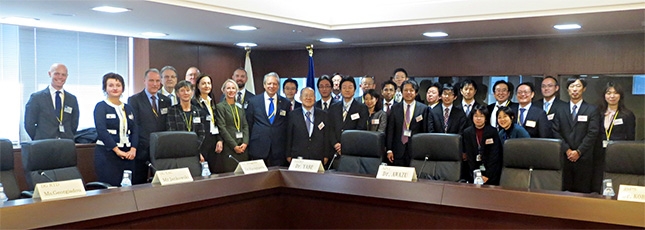Science and Technology
4th Joint Committee on Scientific and Technological Cooperation between Japan and the EU
Joint summary

On 24 November 2017 in Tokyo, H.E. Takeshi Nakane, Ambassador for Science and Technology Cooperation of the Ministry of Foreign Affairs of Japan and H.E. Viorel Isticioaia-Budura, Ambassador of the Delegation of the European Union to Japan, opened the fourth meeting of the Japan-EU Joint Committee on Scientific and Technological Cooperation, organised under the Japan-EU Science and Technology Cooperation Agreement, which entered into force on 29 March 2011. After the opening, the co-chairmanship on the EU side was left to Mr Philippe Vialatte, Deputy Head of Unit for International Cooperation, Directorate-General for Research and Innovation. Ambassador Nakane co-chaired the meeting on the Japanese side.
The Joint Committee Meeting was held with participation of a wide range of ministries and agencies from Japan and the European Commission.
At the beginning of the meeting, the co-chairs recalled the strategic importance of Japan-EU relations in the field of science and technology, to promote excellence of their research, increase the competitiveness of their industries, and effectively address common and global societal challenges. They agreed to jointly work towards the full implementation of the EU-Japan Strategic Partnership in Research and Innovation, as adopted by the 3rd EU-Japan Joint S&T Committee and endorsed by the EU-Japan Summit in May 2015.
Both sides presented the recent developments of their respective Science, Technology and Innovation Policies. They noted the improvement of the framework conditions to facilitate the Japan-EU cooperation, among others, the agreement of Japan Science and Technology Agency (JST) to continue co-fund projects in open Horizon 2020 calls, such as on technologies for first responders. Furthermore, cooperation will be promoted through the cooperation arrangement between the Japan Society for the Promotion of Science (JSPS) and the European Research Council (ERC). The Marie Sklodowska-Curie Actions (MSCA) were highlighted as an important instrument to promote researchers' mobility.
Subsequently, both sides reviewed the research and innovation cooperation actions implemented in the areas of mutual interest since the 3rd Joint S&T Committee meeting in Brussels in 2015, in particular in Information and Communication Technology (ICT), Transport research (notably in Aeronautics, but also cooperation possibilities in Automated Driving Technologies) and Advanced Materials research. Recent developments of collaborative activities in some important areas, such as Health/Medical research, were presented with ideas for future cooperation. Both sides welcomed the Research Framework Arrangement between the National Institute of Advanced Industrial Science and Technology (AIST) and the Joint Research Centre (JRC) that will develop a mutually beneficial cooperation in the fields of Nanotechnology and Chemicals, Metrology and Measurement, and Energy among others.
Both sides also exchanged views on potential areas for future cooperation, such as in Renewable Energy Research, Arctic Research, Disaster Risk Reduction (DRR) (including Nature based solutions and Earthquake Early Warning System), and Quantum Technology. Both sides confirmed the importance of the Horizon 2020 National Contact Point in Japan and the outreach activities to promote public engagement.
Both sides confirmed that the date of the next Joint Committee Meeting would be coordinated through diplomatic channels.


 (145KB)
(145KB)